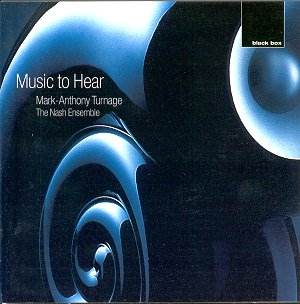So far Mark-Anthony Turnage is probably better-known
for his orchestral music which includes a number of substantial pieces
such as Three Screaming Popes (1988/9), Blood on
the Floor (1993/6) or his double concerto Dispelling the
Fears (1994/5) which may be one of his finest works so far and
for his two operas Greek (1987/8) and the more recent
The Silver Tassie. These might be heard as "public"
statements, but the private man also regularly has its say in a good
deal of chamber works such as the ones here.
Two Memorials (1997 and 2000), for saxophone
or clarinet, were written in memory of teacher Steve Trier and Martin
Robertson’s mother. Two short moving, though restrained elegies of great
beauty.
An Invention on "Solitude"
for clarinet quintet was finally completed in 1997 after unsuccessful
earlier attempts and slightly revised for the present recording. It
of course alludes to Duke Ellington although Ellington’s tune does not
seem to be quoted in this magnificent piece. Turnage also admits some
oblique influence of Brahms’ Clarinet Quintet which "stuck"
with him, though neither direct quotation nor allusion is here. The
clarinet leads the argument throughout though at times it no longer
controls the proceedings. After a climax and some unsettled unrest the
music moves into the appeased nocturnal coda. A minor masterpiece which
deserves wider currency.
Sleep On (1992) for cello and piano is
a favourite of mine which has already been recorded some time ago (NMC
D 019). In its comparative brevity this is one of Turnage’s most moving
and endearing chamber works.
The short Cortège for Chris (cello,
clarinet and piano) is another memorial written in memory of Christopher
van Kampen, the cellist of the Nash Ensemble until his untimely death
in 1997.
Two Elegies Framing a Shout for saxophone
and piano was completed in 1994. As implied by the title this tripartite
piece has a quick, nervous section framed by calmer, meditative outer
sections. The first Elegy is played without accompaniment. The piano
joins in the central section Shout. The second Elegy draws on
material from Junior Addict, a movement from Blood on the
Floor, written in memory of Turnage’s tragically deceased brother.
This again is a beautifully moving piece in spite – or because – of
its utter simplicity.
Three Farewells, completed in 1990, is
the only piece here written for somewhat larger forces (flute, clarinet,
harp and string quartet), though used quite sparingly. Each movement
is based on some hidden text though the composer has now revealed what
the literary sources are. The first ‘Farewell’ (Chorale) evokes
a poem by Brecht in which a dying horse observes starving people eager
to consume its carcass. The second section (Music to Hear), beautifully
scored for viola and cello, reflects on Shakespeare’s Sonnet 80. The
last movement (All will be well) is based on Auden’s translation
of a duet from Mozart’s Magic Flute. It was originally written
as wedding music. "Sadly the marriage did not last...I haven’t
been asked to write a wedding piece since." This is one of the
finest and most subtle pieces in this release.
The concluding item is yet another memorial. Tune
for Toru is a simple song written in memory of Toru Takemitsu
and is now part of a five-movement piano suite True Life Stories
composed between 1995 and 1999. A peaceful, dreamy conclusion to this
magnificent release.
As already evident in the earlier NMC release of Turnage’s
chamber music (NMC D 024 M), all the music here has a restrained confessional
tone far from Turnage’s "public" statements. His chamber music
communicates directly through its simplicity, its subtlety and – more
importantly – through its sincerity.
Martin Robertson plays wonderfully and his colleagues
of the Nash Ensemble are obviously much in tune with Turnage’s contemporary,
though highly accessible and communicative music.
Unreservedly recommended though I for one would have
appreciated some information on the unnamed players of the Nash Ensemble.
Hubert Culot

![]() Martin Robertson (saxophone);
The Nash Ensemble
Martin Robertson (saxophone);
The Nash Ensemble ![]() BLACK BOX BBM 1065
[58:30]
BLACK BOX BBM 1065
[58:30]